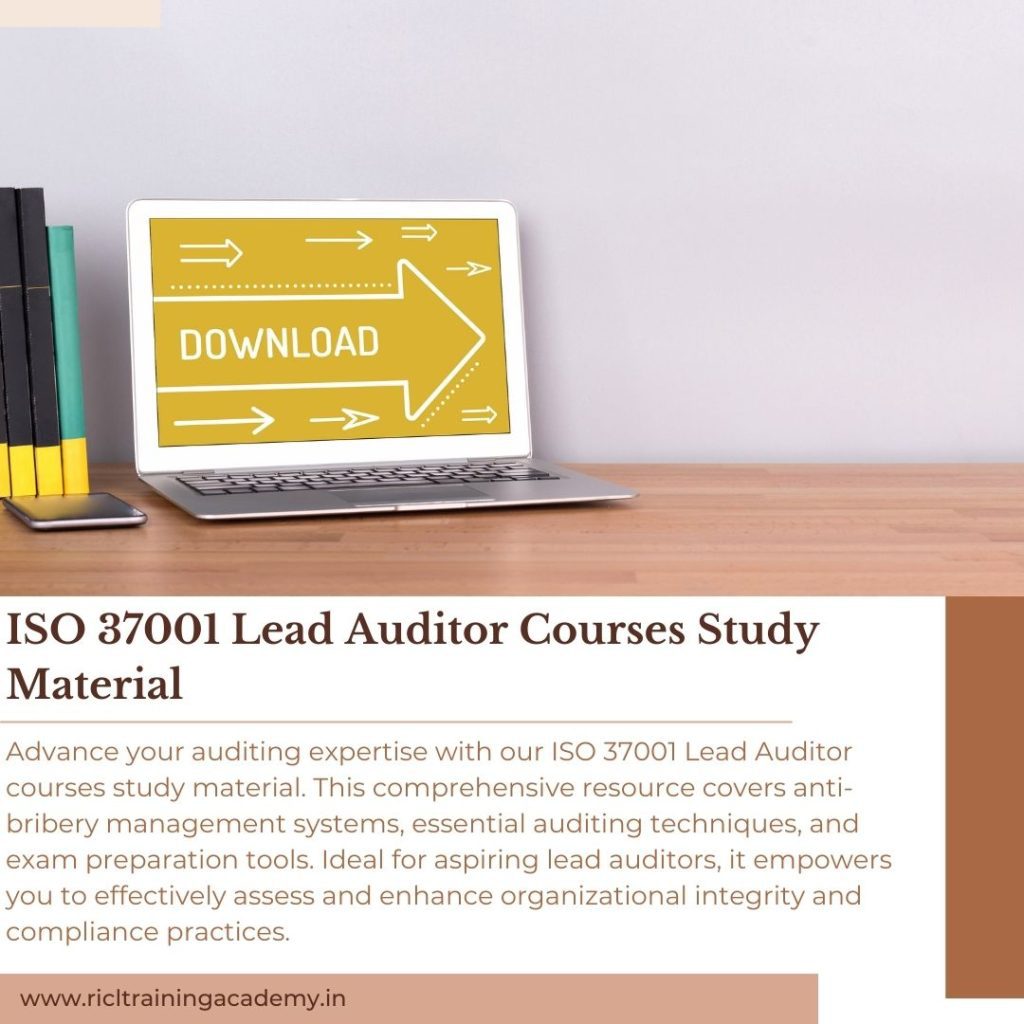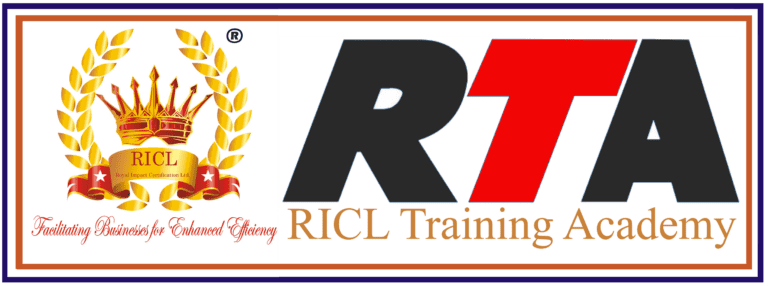Explore key study materials for ISO 37001 Lead Auditor courses. Equip yourself with the right resources to excel in anti-bribery auditing. ISO 37001 is an international standard designed to help organizations implement and maintain an Anti-bribery management system
ISO 37001 Lead Auditor Courses Study Material

ISO 37001: An International Standard on Anti-Bribery Management System
ISO 37001 is an international standard designed to help organizations implement and maintain an Anti-bribery management system. It considers the establishment, implementation, maintenance, and improvement of the compliance programs for prevention and detection of the bribery risks, along with the methods for resolution. The standard is applicable to the organization irrespective of its size, sector, or geographical location. This standard supplements other related initiatives on compliance.
ISO 37001 allows organizations to control exposure to bribery on a coherent method that includes the identification of risk, control implementation, and effectiveness monitoring. The standard places particular emphasis on the role of organization leadership, training, and awareness, and is especially required for those involved in corporate governance, compliance, and risk management.
Lead Auditor Course Purpose
The ISO 37001 Lead Auditor course is designed to provide professionals with the knowledge and skills that will enable them to conduct anti-bribery management system audits. This, in particular, benefits the auditors, compliance officers, and other professionals charged with ensuring an organization’s ABMS meets the requirements of ISO 37001.
This course will enable participants to learn how to lead audits, assess an organization’s ABMS, and find out whether it addresses all the requirements of the standard. The course will also cover the principles of auditing, managing an audit team, and reporting the findings from an audit. By the end of the class, participants will have the necessary competence to assess the compliance of any given organization against the requirements of ISO 37001 and provide appropriate insights with regards to anti-bribery practices.
Key components of study material
- Knowledge of ISO 37001 Requirements
Scope and Purpose: This shall cover some mere essentials and scope of ISO 37001. It needs to explain the purpose of the standard in prevention, detection, and response to bribery within organizations.
Context of the Organization: The context of the organization that has to be researched while implementing ABMS such as external and internal issues at hand and stakeholder expectations.
Leadership and Commitment: Commitment of top management to anti-bribery measures is identified; it runs from putting in place an anti-bribery policy and accountability to resource availability.
Planning and Support: The effective planning requirements are outlined in this section that includes risk assessment, definition of objectives, and resource allocation. The support functions reviewed here include communication, awareness, and training.
- Auditing Techniques and Best Practices
Principles of Audit and Audit Types: Detailed explanations of different auditing principles are included in the study material, along with various types of audits, such as first, second, and third-party audits.
Audit Planning and Implementation: It expounds upon the very important aspects of audit planning, which encompasses defining the objectives, selecting audit criteria, and preparing audit checklists, among other things. Its implementation involves conducting opening meetings, gathering evidence, and interviewing key personnel.
Non-Conformities and Corrective Actions: Enumerate identification and reporting methods of non-conformities observed in an audit and corrective action taken by organizations to address such non-conformity. Audit Reporting: Discuss how to provide an audit report by documenting findings, conclusions, and recommendations in brief and then clearly presenting the results to the concerned stakeholders.
- Case Studies and Practical Exercises
Real-Life Scenarios: The course materials include several case studies that represent real-life scenarios, which could be developed. These scenarios allow course participants to apply their knowledge in a practical manner to real-life situations, such as conducting an assessment related to the risk of bribery within an organization or the adequacy of controls.
Role-Playing Exercises: There are also some role-playing exercises that course participants undertake as auditors, auditees, or any other stakeholders. In such a way, participants get to apply skills related to conducting interviews and reviewing documents as a way of arriving at audit decisions. Besides, there are workshops and group discussions that allow participants to share experiences and insights, further solidifying their knowledge on ISO 37001 and audit techniques.
4. Tools and Techniques for Effective Auditing
Audit Checklists: Study materials contain broad and comprehensive checklists on all provisions of ISO 37001. The checklists are handy tools for use by the implementer to ensure that all areas of interest have been taken during an audit exercise.
Risk Assessment Tools: Participants are provided with a variety of explanations about risk assessment tools and techniques that might be available to assess bribery risks facing an organization. This includes topics such as identification of risk factors, assessment of likelihood and impact, and identification of appropriate controls.
Interview Techniques: Here, tips on how best to perform an effective interview during an audit are included. This section helps auditors develop those skills to be able to ask the right questions, gather accurate information, and assess the credibility of interviewees.
Techniques of Document Review: In this module, learners are trained on how to review and appraise various documents belonging to an organization’s ABMS. The documents include record, policies, and procedures that are reviewed and scanned to figure out the existing gaps or irregularities.
- Certification Process and Career Advancement
Certification: There are three aspects of certification in order to be specified as an ISO 37001 Lead Auditor. The study material identifies those various requirements and they are completion of the training course, passing the examination, and obtaining practical auditing experience.
Continuing Professional Development: Certification is only the start since CPD is a must to keep that certification. The session is bound to give ideas on how certification as a lead auditor can be advanced in order to comply with the requirements.
Career Opportunities: This course covers career opportunities and directions for the ISO 37001 Lead Auditors. This career path could be internal and external audits, compliance, risk management, and consultancy.
Conclusion
The study material to be covered in ISO 37001 Lead Auditor courses is comprehensive and developed based on equipping the practitioners with knowledge and know-how skills of auditing anti-bribery management systems. From understanding the requirements of ISO 37001 to mastering audit techniques, the material encapsulates the key areas that will equip a delegate with the ability to be a successful lead auditor. The practical exercises, tools, and techniques included further augment the learning process and provide important knowledge for any person who wishes to excel in the area of compliance and anti-bribery management.
Lead Auditor & Internal Auditor Training: QMS, EMS, OHSMS + Awareness Courses
Refine your know-how in Quality Management Systems by taking our all-inclusive Lead Auditor QMS training course. We equip you with skills necessary for effective auditing as well as ensuring conformance with ISO standards. It is an excellent resource for people who want to become professionals in QMS auditing through detailed knowledge and practical information.”
Become a certified Lead Auditor in Environmental Management Systems with our specialized training course. This program offers necessary know-how and skills for conducting effective inspections while also promoting environmental compliance according to ISO regulations. The perfect opportunity for those looking to progress their career further into the realm of environmental management”
Pursue your career growth using our Lead Auditor OHSMS training course, which is tailored towards equipping you with the skills needed to undertake comprehensive evaluations of Occupational Health and Safety Management Systems. Obtain practical capabilities as well as experience that guarantee individual workplaces’ security conformity with the most recent ISO requirements”.
Our Internal Auditor QMS training can help you improve your auditing skills. This course covers the principles and practices necessary for conducting internal audits of Quality Management Systems. Ideal for professionals looking to increase their understanding of QMS and contribute to organizational excellence.
Our Internal Auditor EMS course will help you enhance your skills in environmental auditing. Learn techniques and standards needed to implement efficient internal audits of environmental management systems, ensuring ISO compliance and its environmental sustainability.
The purpose of our Internal Auditor OHSMS training is to equip you with the necessary skills to conduct effective internal audits. This course gives an extensive overview on how to audit Occupational Health & Safety Management Systems so that you can achieve compliance and create a safe workplace.
Hone your understanding of Quality Management Systems (QMS) through our Awareness Auditor QMS. These courses provide a basic understanding of the principles, benefits and implementation strategies of QMS making them instrumental for improving quality management practices by individuals or teams.
Familiarize yourself with essential knowledge regarding the Environmental Management Systems by exploring our Awareness Auditor EMS. The courses offer an overview of the principles of EMS which will help you comprehend environmental policies and procedures along with their importance in achieving sustainability targets.
Out training programs on Occupational Health and Safety Management Systems are meant to improve your awareness in this field. This course is intended for organizations and individuals, they provide essential information on OHSMS principles and practices that lead to safer and compliant work environments.
Other Blogs
- Adaptability Thrive in a Dynamic World
- Artistic Sense Elevate Expression & Drive Innovation
- Body Language A Key Form of Non-Verbal Communication
- Business Ethics: Upholding Integrity and Sustainability
- Business Etiquette Cultivating Professionalism and Success
- Business Trend Awareness Stay Ahead & Drive Success
- Collaboration Foster Synergy for Collective Success
- Competitiveness Driving Excellence & Superior Performance
- Conflict Resolution Navigate Tensions for Positive Results
- Crisis Management Strategic Response & Communication
- Critical Thinking Empower Strategic Decisions
- Customer Service Excellence: Fostering Relationships and Driving Success
- Customizing ISO Training for Different Industry Needs: A Tailored Approach
- Dealing with Difficult People Constructive Interaction Tips
- Decision Making: Strategies for Complex Environments
- Delegation Strategic Empowerment for Success
- Design Sense Inspire Creativity & Spark Innovation
- Diplomacy Navigate Relationships & Achieve Goals
- Disability Awareness Embracing Inclusion and Empowerment
- Dispute Resolution Foster Collaboration & Harmony
- Diversity Awareness Fostering Inclusion and Collaboration
- Empathy Enhance Understanding & Build Stronger Connections
- Entrepreneurial Thinking Cultivating Innovation and Initiative
- Facilitation Enhance Group Dynamics Effectively
- Feeling Stagnant in Your Career? Start Here
- Giving Feedback Bridging Performance Gaps Effectively
- Humor A Universal Aspect of Human Experience
- Inspiring Cultivate Authentic Leadership
- Interviewing Skills Effective Communication in Recruitment
- ISO 14001 Lead Auditor Courses PDF Download
- ISO 14001 Lead Auditor Courses Study Material
- ISO 14001: Environmental Management Training Essentials
- ISO 22301 Internal Auditor Courses Material Download
- ISO 22301 Lead Auditor Courses Fees
- ISO 22301 Lead Auditor Courses Material Download
- ISO 22301 Lead Auditor Courses PDF Download
- ISO 30000 Internal Auditor Courses Material Download
- ISO 37001 Lead Auditor Courses PDF Download
- ISO 37001 Lead Auditor Courses Study Material
- ISO 41001 Internal Auditor Courses Material Download
- ISO 41001 Lead Auditor Courses Material Download
- ISO 41001 Lead Auditor Courses PDF Download
- ISO 41001 Lead Auditor Courses Study Material
- ISO 45001 Internal Auditor Courses Material Download
- ISO 45001 Lead Auditor Courses Fees
- ISO 45001 Lead Auditor Courses Material Download
- ISO 45001 Lead Auditor Courses PDF Download
- ISO 45001 Lead Auditor Courses Study Material
- ISO 50001 Internal Auditor Courses Material Download
- ISO 50001 Lead Auditor Courses Fees
- ISO 50001 Lead Auditor Courses Material Download
- ISO 50001 Lead Auditor Courses PDF Download
- ISO 50001 Lead Auditor Courses Study Material
- ISO 50001 Energy Management Training for Sustainability
- ISO 9001 Certification A Comprehensive Training Guide
- ISO 9001 Internal Auditor Courses Material Download
- ISO 9001 Lead Auditor Certificate Course
- ISO 9001 Lead Auditor Certification in India
- ISO 9001 Lead Auditor Courses Benefits
- ISO 9001 Lead Auditor Courses Cost
- ISO 9001 Lead Auditor Courses Exam Question and Answers
- ISO 9001 Lead Auditor Courses Fees
- ISO 9001 Lead Auditor Courses Fees
- ISO 9001 Lead Auditor Courses Fees in Chennai,Noida,Delhi
- ISO 9001 Lead Auditor Courses PDF Download
- ISO 9001 Lead Auditor Courses Study Material
- ISO Certification in Delhi NCR
- ISO Certification in India
- ISO Certification in Noida
- ISO Full Form
- ISO Lead Auditor Training Near Noida
- ISO Training for New Employees: Onboarding and Integration Best Practices
- Latest ISO Training Courses & Certificates
- Lead Auditor Certification
- Lead Auditor Course
- Lead Auditor ISO 14001 Course
- Lead Auditor ISO 22000 Course
- Lead Auditor ISO 45001 Course
- Lead Auditor ISO 9001 Course
- Lead Auditor Online Courses
- Lead Auditor Salary
- Lead Auditor Training
- Lead Auditor Training Provider in Delhi
- Lead Auditor Training Provider in India
- Lead Auditor Training Provider in Noida
- Listening The Cornerstone of Effective Communication
- Adaptability Thrive in a Dynamic World
- Artistic Sense Elevate Expression & Drive Innovation
- Body Language A Key Form of Non-Verbal Communication
- Business Ethics: Upholding Integrity and Sustainability
- Business Etiquette Cultivating Professionalism and Success
- Business Trend Awareness Stay Ahead & Drive Success
- Collaboration Foster Synergy for Collective Success
- Competitiveness Driving Excellence & Superior Performance
- Conflict Resolution Navigate Tensions for Positive Results
- Crisis Management Strategic Response & Communication
- Critical Thinking Empower Strategic Decisions
- Customer Service Excellence: Fostering Relationships and Driving Success
- Customizing ISO Training for Different Industry Needs: A Tailored Approach
- Dealing with Difficult People Constructive Interaction Tips
- Decision Making: Strategies for Complex Environments
- Delegation Strategic Empowerment for Success
- Design Sense Inspire Creativity & Spark Innovation
- Diplomacy Navigate Relationships & Achieve Goals
- Disability Awareness Embracing Inclusion and Empowerment
- Dispute Resolution Foster Collaboration & Harmony
- Diversity Awareness Fostering Inclusion and Collaboration
- Empathy Enhance Understanding & Build Stronger Connections
- Entrepreneurial Thinking Cultivating Innovation and Initiative
- Facilitation Enhance Group Dynamics Effectively
- Feeling Stagnant in Your Career? Start Here
- Giving Feedback Bridging Performance Gaps Effectively
- Humor A Universal Aspect of Human Experience
- Inspiring Cultivate Authentic Leadership
- Interviewing Skills Effective Communication in Recruitment
- ISO 14001 Lead Auditor Courses PDF Download
- ISO 14001 Lead Auditor Courses Study Material
- ISO 14001: Environmental Management Training Essentials
- ISO 22301 Internal Auditor Courses Material Download
- ISO 22301 Lead Auditor Courses Fees
- ISO 22301 Lead Auditor Courses Material Download
- ISO 22301 Lead Auditor Courses PDF Download
- ISO 30000 Internal Auditor Courses Material Download
- ISO 37001 Lead Auditor Courses PDF Download
- ISO 37001 Lead Auditor Courses Study Material
- ISO 41001 Internal Auditor Courses Material Download
- ISO 41001 Lead Auditor Courses Material Download
- ISO 41001 Lead Auditor Courses PDF Download
- ISO 41001 Lead Auditor Courses Study Material
- ISO 45001 Internal Auditor Courses Material Download
- ISO 45001 Lead Auditor Courses Fees
- ISO 45001 Lead Auditor Courses Material Download
- ISO 45001 Lead Auditor Courses PDF Download
- ISO 45001 Lead Auditor Courses Study Material
- ISO 50001 Internal Auditor Courses Material Download
- ISO 50001 Lead Auditor Courses Fees
- ISO 50001 Lead Auditor Courses Material Download
- ISO 50001 Lead Auditor Courses PDF Download
- ISO 50001 Lead Auditor Courses Study Material
- ISO 50001 Energy Management Training for Sustainability
- ISO 9001 Certification A Comprehensive Training Guide
- ISO 9001 Internal Auditor Courses Material Download
- ISO 9001 Lead Auditor Certificate Course
- ISO 9001 Lead Auditor Certification in India
- ISO 9001 Lead Auditor Courses Benefits
- ISO 9001 Lead Auditor Courses Cost
- ISO 9001 Lead Auditor Courses Exam Question and Answers
- ISO 9001 Lead Auditor Courses Fees
- ISO 9001 Lead Auditor Courses Fees
- ISO 9001 Lead Auditor Courses Fees in Chennai,Noida,Delhi
- ISO 9001 Lead Auditor Courses PDF Download
- ISO 9001 Lead Auditor Courses Study Material
- ISO Certification in Delhi NCR
- ISO Certification in India
- ISO Certification in Noida
- ISO Full Form
- ISO Lead Auditor Training Near Noida
- ISO Training for New Employees: Onboarding and Integration Best Practices
- Latest ISO Training Courses & Certificates
- Lead Auditor Certification
- Lead Auditor Course
- Lead Auditor ISO 14001 Course
- Lead Auditor ISO 22000 Course
- Lead Auditor ISO 45001 Course
- Lead Auditor ISO 9001 Course
- Lead Auditor Online Courses
- Lead Auditor Salary
- Lead Auditor Training
- Lead Auditor Training Provider in Delhi
- Lead Auditor Training Provider in India
- Lead Auditor Training Provider in Noida
- Listening The Cornerstone of Effective Communication

TESTIMONIALS
What Our Cutomers are Saying About us

Ruis aute irure dolor in reprehender voluptate velit esse cillum dolore fugiat pariatur sint occaecat cupidata non proie sunt in culpa aui officede









Reach us at:
info@ricltrainingacademy.in
support@ricltrainingacademy.in
sales@ricltrainingacademy.in
complaint@ricltrainingacademy.in
Call us at:
9355650992
9355650993
Visit us at:
Royal Impact Certification Limited
623 Tower -B, The Ithum Sector – 62, Noida, 201301.
Copyright © 2024 RICL Training Academy Team


